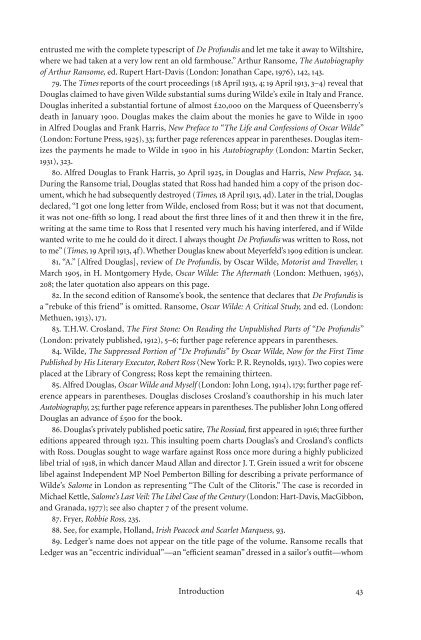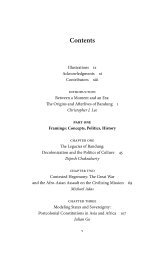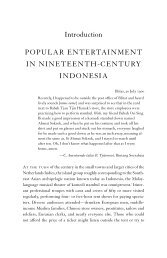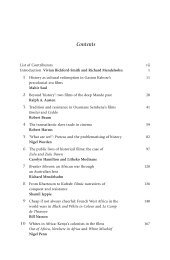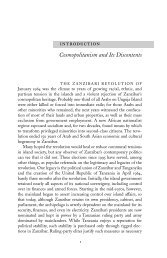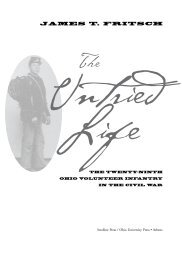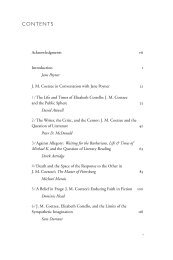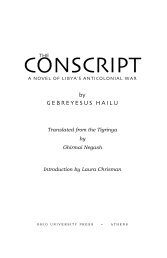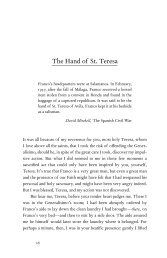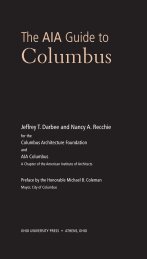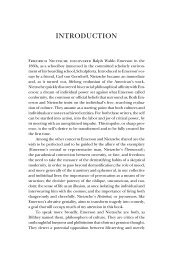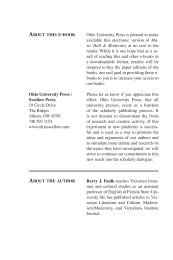Oscar Wilde and Modern Culture - Ohio University Press & Swallow ...
Oscar Wilde and Modern Culture - Ohio University Press & Swallow ...
Oscar Wilde and Modern Culture - Ohio University Press & Swallow ...
You also want an ePaper? Increase the reach of your titles
YUMPU automatically turns print PDFs into web optimized ePapers that Google loves.
entrusted me with the complete typescript of De Profundis <strong>and</strong> let me take it away to Wiltshire,<br />
where we had taken at a very low rent an old farmhouse.” Arthur Ransome, The Autobiography<br />
of Arthur Ransome, ed. Rupert Hart-Davis (London: Jonathan Cape, 1976), 142, 143.<br />
79. The Times reports of the court proceedings (18 April 1913, 4; 19 April 1913, 3–4) reveal that<br />
Douglas claimed to have given <strong>Wilde</strong> substantial sums during <strong>Wilde</strong>’s exile in Italy <strong>and</strong> France.<br />
Douglas inherited a substantial fortune of almost £20,000 on the Marquess of Queensberry’s<br />
death in January 1900. Douglas makes the claim about the monies he gave to <strong>Wilde</strong> in 1900<br />
in Alfred Douglas <strong>and</strong> Frank Harris, New Preface to “The Life <strong>and</strong> Confessions of <strong>Oscar</strong> <strong>Wilde</strong>”<br />
(London: Fortune <strong>Press</strong>, 1925), 33; further page references appear in parentheses. Douglas itemizes<br />
the payments he made to <strong>Wilde</strong> in 1900 in his Autobiography (London: Martin Secker,<br />
1931), 323.<br />
80. Alfred Douglas to Frank Harris, 30 April 1925, in Douglas <strong>and</strong> Harris, New Preface, 34.<br />
During the Ransome trial, Douglas stated that Ross had h<strong>and</strong>ed him a copy of the prison document,<br />
which he had subsequently destroyed (Times, 18 April 1913, 4d). Later in the trial, Douglas<br />
declared, “I got one long letter from <strong>Wilde</strong>, enclosed from Ross; but it was not that document,<br />
it was not one-fifth so long. I read about the first three lines of it <strong>and</strong> then threw it in the fire,<br />
writing at the same time to Ross that I resented very much his having interfered, <strong>and</strong> if <strong>Wilde</strong><br />
wanted write to me he could do it direct. I always thought De Profundis was written to Ross, not<br />
to me” (Times, 19 April 1913, 4f). Whether Douglas knew about Meyerfeld’s 1909 edition is unclear.<br />
81. “A.” [Alfred Douglas], review of De Profundis, by <strong>Oscar</strong> <strong>Wilde</strong>, Motorist <strong>and</strong> Traveller, 1<br />
March 1905, in H. Montgomery Hyde, <strong>Oscar</strong> <strong>Wilde</strong>: The Aftermath (London: Methuen, 1963),<br />
208; the later quotation also appears on this page.<br />
82. In the second edition of Ransome’s book, the sentence that declares that De Profundis is<br />
a “rebuke of this friend” is omitted. Ransome, <strong>Oscar</strong> <strong>Wilde</strong>: A Critical Study, 2nd ed. (London:<br />
Methuen, 1913), 171.<br />
83. T.H.W. Crosl<strong>and</strong>, The First Stone: On Reading the Unpublished Parts of “De Profundis”<br />
(London: privately published, 1912), 5–6; further page reference appears in parentheses.<br />
84. <strong>Wilde</strong>, The Suppressed Portion of “De Profundis” by <strong>Oscar</strong> <strong>Wilde</strong>, Now for the First Time<br />
Published by His Literary Executor, Robert Ross (New York: P. R. Reynolds, 1913). Two copies were<br />
placed at the Library of Congress; Ross kept the remaining thirteen.<br />
85. Alfred Douglas, <strong>Oscar</strong> <strong>Wilde</strong> <strong>and</strong> Myself (London: John Long, 1914), 179; further page reference<br />
appears in parentheses. Douglas discloses Crosl<strong>and</strong>’s coauthorship in his much later<br />
Autobiography, 25; further page reference appears in parentheses. The publisher John Long offered<br />
Douglas an advance of £500 for the book.<br />
86. Douglas’s privately published poetic satire, The Rossiad, first appeared in 1916; three further<br />
editions appeared through 1921. This insulting poem charts Douglas’s <strong>and</strong> Crosl<strong>and</strong>’s conflicts<br />
with Ross. Douglas sought to wage warfare against Ross once more during a highly publicized<br />
libel trial of 1918, in which dancer Maud Allan <strong>and</strong> director J. T. Grein issued a writ for obscene<br />
libel against Independent MP Noel Pemberton Billing for describing a private performance of<br />
<strong>Wilde</strong>’s Salome in London as representing “The Cult of the Clitoris.” The case is recorded in<br />
Michael Kettle, Salome’s Last Veil: The Libel Case of the Century (London: Hart-Davis, MacGibbon,<br />
<strong>and</strong> Granada, 1977); see also chapter 7 of the present volume.<br />
87. Fryer, Robbie Ross, 235.<br />
88. See, for example, Holl<strong>and</strong>, Irish Peacock <strong>and</strong> Scarlet Marquess, 93.<br />
89. Ledger’s name does not appear on the title page of the volume. Ransome recalls that<br />
Ledger was an “eccentric individual”—an “efficient seaman” dressed in a sailor’s outfit—whom<br />
Introduction 43


